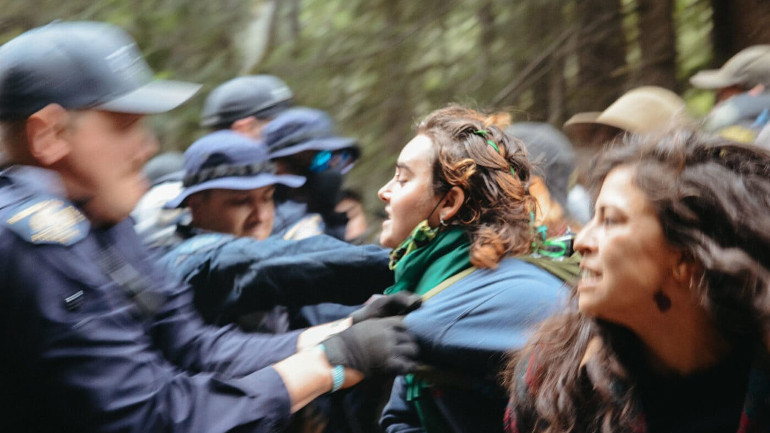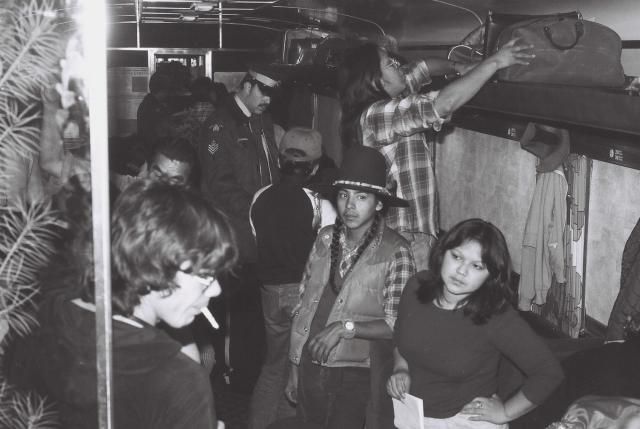The BC Supreme Court made news in September by deciding not to extend an injunction against old-growth logging protesters at the Fair Creek watershed. This would have ended the ongoing RCMP enforcement of the injunction, had the BC Court of Appeal not granted a temporary injunction about a week later. Protesters have been in the area setting up blockades since August 2020. They are organized by the grassroots group, Rainforest Flying Squad, and intend to block the logging company, Teal Jones, from accessing the watershed. The BC Supreme Court granted the original injunction against the protesters in April 2021, which the RCMP was tasked with enforcing.
The RCMP have been aggressive and violent in their enforcement of the injunction. Various videos have been circulated, one showing police officers using pepper spray at close range into a crowd, another showing police officers ripping COVID face masks off two women before spraying them with pepper spray. Journalists and other witnesses have reported seeing people being dragged, choked, kicked and punched by police. One witness reported seeing a police officer pick up a woman by her hair and spray pepper spray into her mouth. As of the end of September over 1,100 people have been arrested by the police, surpassing the height of the War in the Woods protests in Clayoquot Sound in the early 1990s.
The RCMP even went so far as to restrict journalists’ access to the site by enforcing “exclusion zones,” starting in May. This brazen policy of the RCMP to prevent coverage of their own activities was appealed by the Canadian Association of Journalists and a coalition of independent media outlets. In July, a provincial judge ruled in the journalists’ favour, deciding that the extensive exclusion zones set up by the RCMP were not “reasonably necessary” for them to do their job.
Justice Douglas Thompson cited the police brutality in his decision to not extend the injunction. While acknowledging that failing to extend the injunction could harm Teal Jones’ financial interests, he claimed these were ultimately outweighed by “the public interest in protecting the court from the risk of further depreciation of its reputation.” The decision to not extend the injunction despite the violation of Teal Jones’ property rights was surprising to many activists and observers, but it was short-lived. Just about a week later Teal Jones was able to convince BC Court of Appeal Justice Sunni Stromberg-Stein to grant a temporary injunction while the logging company appeals Justice Thompson’s decision. Teal Jones complained about the “irreparable harm” of lifting the injunction, which Stromberg-Stein agreed with. Never mind the “irreparable harm” to the logged forest!
Socialist Alternative welcomed the decision not to renew the injunction, which would have ended the RCMP’s pretext to be there and assault protesters. But even if the injunction had been allowed to expire according to Justice Thompson’s decision it would not have been justice done. Real justice would mean undoing the damage already done: scrapping the 1,100 arrests, reversing all fines and expunging all criminal records. The RCMP should pay damages for those who were injured or whose personal effects were destroyed by police. The senior officers responsible should face prosecution for assault. But Justice Thompson’s decision seemed to be primarily interested in protecting the court’s reputation rather than restoring justice.
While we unequivocally condemn the police brutality against the protesters, we must note that the protesters are not exactly welcomed by the official leadership of Pacheedaht First Nation. The band council (elected under the colonial system), including Chief Jeff Jones, have publicly asked the protesters to leave and to allow the Nation to decide how it would like to be involved in the management of old growth on their territory. There is an ongoing conversation within the Nation on the situation. Frank Queesto Jones, the hereditary chief recognized by the elected leadership, has joined the call to ask protesters to leave (Note: Frank Queesto Jone’s status as hereditary chief is disputed by some within the Nation). Others, such as Elder Bill Jones, have publically welcomed the protectors.
As we outlined in a previous article, the First Nation’s leadership is placed in a very difficult position with regard to management of their natural resources. They are tasked with ensuring a level of prosperity and quality of life to their members, but they are forced to do so within the boundaries of the colonial capitalist state, which has consistently underfunded their services, houses, schools, etc.; and they are faced with all the contradictions and perverse incentives inherent in that economic system.
In June, the Pacheedaht First Nation, along with neighbouring Ditidaht and Huu-ay-aht First Nations reached an agreement with the provincial government to defer all old-growth logging in Fairy Creek for two years. It’s clear that the Nations and the Province hoped that this move would diffuse the situation at the blockades and convince the protesters to go home. However, the blockades did not come down. In part this is because the deferral only affected logging of old growth in the Fairy creek watershed, and Teal Jones was fully intending to continue logging activities in the nearby area.
According to a 2020 study, only 3 percent of BC’s forests remain capable of supporting old trees, and only 2.7 percent of the trees are actually old (that is to say 250 years or older). That means that capitalist “management” of the forests have logged out almost all of the old growth in the province and in so doing have left the forests in a state that will not allow them to renew themselves. One thing is clear: there should be no need to choose between protecting old growth forests and ensuring the economic prosperity of the members of the Pacheedaht Nation. It is only due to the violent imposition of the colonial and capitalist economic system of Canada that the Nation is forced to make these kinds of calculations.
The BC NDP government, for their part, is eager to be seen engaging in “profit-sharing” agreements with the Nations, seeing this as part of their commitment to uphold the United Nations Declaration of the Rights of Indigenous Peoples. But this just demonstrates the social democratic party’s failure to see beyond the horizon of the capitalist system and provide real leadership towards protecting and preserving old-growth forests.
Socialist Alternative calls for the end of the commodification of forests and the preservation of all remaining old growth. The cutting of trees for lumber should be managed democratically, ensure the long-term health of the forests, and be used for the benefit of the community rather than to be sold to make profits for the license-holders. We support the right to self-determination for all Indigenous nations and the rights of nations to control the land and resources in their traditional territory. The Canadian state bears responsibility for the loss of land and livelihood of Indigenous people caused by hundreds of years of colonial capitalist expansion.




